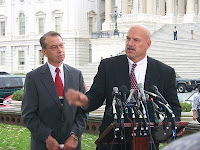“[Jesse] Ventura’s election [as governor] carries important implications for politics in Minnesota and the nation as a whole. His triumph seems so beyond the pale that a lot must be happening in our politics to cause it. And a lot is. Jesse’s ascendancy underscores the great and growing weaknesses of our two major parties with the public. It reveals that third parties have a future in American politics only if national campaign finance and voter registration rules come to resemble those now in force in Minnesota. The success of Ventura’s unorthodox, low-budget campaign ads exposes the shortcomings of conventional political advertising. And, perhaps most disturbingly, Jesse’s rise to the top confirms the growing power of celebrity and entertainment in American politics.”—American political scientist Steven Schier, “Jesse’s Victory,” The Washington Monthly, January/February 1999
Schier’s article struck me as prescient in a way that
few analysts could have imagined nearly a quarter-century ago, particularly for
Presidential elections. The “great and growing weaknesses of our two major
parties” and “the growing power of celebrity and entertainment in American
politics” were both on full display in 2016, and in the years since.
But what Schier didn’t anticipate was that another
candidate, on a national stage, could spring from the same world of wrestling
that spawned Jesse Ventura. That person (do I even have to say his name?), noted
The Atlantic’s James Fallows seven years ago, specialized in
humiliation: “inflicting it on others, avoiding it oneself.”
In one wrestling match before that candidate’s
unexpected foray into politics, continued Fallows, he had shaved the head of rival promoter Vince
McMahon—“a spectacle [featuring] every ritual of dominance, emasculation,
ridicule, and humiliation—even with all allowances made for the phony melodrama
on which pro wrestling is built.”
Even the parade of insulting nicknames trotted out by
that candidate is redolent of the world of wrestling, with its arch-villains:
“Sleepy Joe,” “Crooked Hillary,” “Lyin’ Ted," “Low-Energy Jeb,” and now, God
help us, “Meatball Ron.”
I never thought, though, that professional wrestling could
produce the flood of conspiracy theories promoted by that Presidential candidate
or Mr. Ventura (who, over 12 years ago, claimed that the attack on the World
Trade Center resulted from a government plot—a suggestion made on his cable TV
show called, yep, “Conspiracy Theory”). (See Tony Pierce’s blog post from
the Website of the Los Angeles Times.)
Jesse Ventura served a single term as governor of
Minnesota. But years from now, historians will still be analyzing how, even in his short time as candidate and officeholder, he paved
the way for the phantom menace of contemporary American politics.
(The image accompanying this post, showing Ventura
with Iowa Senator Chuck Grassley, was taken at a press conference on trade,
held on October 5, 2000.)

No comments:
Post a Comment